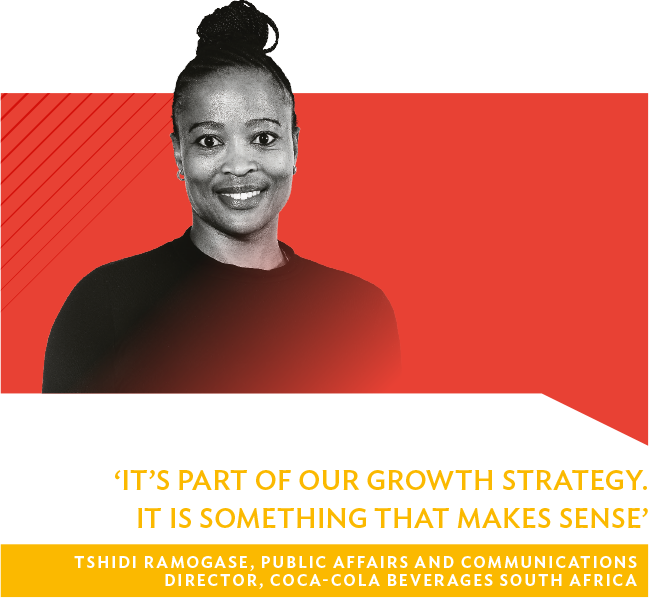One of the strengths of SMEs is that they are agile enough to quickly exploit business opportunities that come their way. However, they just need big companies to present such opportunities in the first place.
Brad Green, executive chairman of B1SA Compliance Management Solutions, agrees that it is vital for big businesses to develop and support SMEs but ‘big business needs to ensure that their support is sustainable. Ultimately, sustainable support implies improving supply efficiencies, supply risk or price’.
According to Green, one of the most valuable ways of support entails the beneficiary becoming a significant supplier to the big business, or growing their client base because of its support. That said, there are some stumbling blocks to incorporating SMEs into the supply chain, he says.
‘The first is diligently performing demand-side analysis to assess where short-term support of an SME can potentially be supported later by supply contracts. The second is that SMEs battle to compete on price with larger enterprises.’
Litha Kutta, head of enterprise and supplier development at Telkom, says it is important that in the ICT space innovation is stimulated and supported. ‘Small businesses and emerging companies are some of the best at devising innovative solutions,’ he says.
According to Kutta, Telkom works with SMEs by providing them with market access, financial and non-financial support by using them to supply goods and services, and as a channel to sell their products and services. ‘We enabled 11 SMEs to sell Telkom products,’ he says. ‘Over the past 18 months, they’ve generated more than R12 million in revenue.’ Telkom, through its enterprise and supplier development programme, FutureMakers, has implemented several initiatives to support and develop black-owned SMEs in particular. The support includes the R150 million FutureFund, R28 million for start-up support, an early-stage funding programme with R42 million available, and R80 million in venture capital for growing enterprises. It also offers non-financial support.
‘Strong SMEs need to have well-defined business management skills,’ says Kutta. ‘We support them through a FutureProof programme, offering connectivity support and non-financial support. We work with partners such as Cisco, Accenture and Microsoft, among others, to enable this.’
Kutta adds that working with SMEs is not only beneficial for the smaller company but Telkom too. ‘We benefit from having a stronger supplier base and from bringing new participants into our supply chain. It helps us to diversify. Some of our SMEs become our future customers too.’
Better yet, ‘SMEs provide sleek, quick and cost-effective services’, he says, adding that ‘working with them allows us to diversify our spending – many SMEs provide goods and services at costs quite acceptable to our strategy’. But what’s most important, he says, is the job creation aspect.
‘SMEs present the best opportunities for unemployed youths. As big business, it’s our job to ensure we support SMEs and encourage them to hire youngsters and skill them up. This is also good for nation building. If we have a thriving economy of SMEs, this bodes well for our sustainability as a country.’
According to Suzanne Ackerman-Berman, Pick n Pay’s director of transformation: ‘Facilitating small business development in the retail sector, particularly of black- and women-owned businesses is essential to grow our economy, drive employment and empower individuals. We recognise that many small suppliers have challenges in accessing funding, growing scale and achieving a viable business. Through our enterprise and supplier development division, we maintain a leading role in mentoring, encouraging and enabling small-scale entrepreneurs to become sustainable suppliers to the retail industry.’
Pick n Pay has made a substantial impact on the SA economy through its direct supply chain, spending more than R67.7 billion in direct procurement in the 2017 financial year, and sustaining more than 400 000 jobs across the country through its supply chain. In 2016, the retailer held an entrepreneurship programme, BoostYourBiz, aimed at empowering and developing aspirant entrepreneurs and suppliers. The top 50 entrants were chosen from a pool of 540 to participate in an intensive six-week training programme, after which a judging panel selected 24 finalists – more than half of whom were women. A second BoostYourBiz is planned for 2018.
Coca-Cola Beverages South Africa (CCBSA) works with SMEs primarily through its network of local distribution partners (LDPs). This year alone, it has added 50 community entrepreneurs to the network, bringing the total number of LDPs to 149. CCBSA helps local distribution partners become third-party distributors of its products, creating plentiful employment opportunities, mainly in townships. These opportunities are in the form of business ownership, as well as work for drivers, crew and warehouse staff. A growing number of women and youth entrepreneurs are seizing the chance to own a business, and 90% of local distribution partners come from previously disadvantaged groups.
According to Tshidi Ramogase, public affairs and communications director for CCBSA, SMEs comprise around 68% of the company’s supply chain, servicing most of their smaller customers. SMEs are crucial to growing the local market, she says. ‘You don’t have a business if you don’t have a market.’ Moreover, the success is shared. ‘They grow, we grow. They succeed, we succeed.’
Ramogase says it’s crucial that big businesses give SMEs a helping hand but she cautions that the right attitude needs to first be in place. ‘In my experience, if we position this as something that big business must do, we won’t get enough buy in. It’s better to understand why you need to do something and let it form part of your strategy and your survival as a business. In our business, everybody understands why this is integral to their jobs – it’s part of our growth strategy. It’s not something we have to do, it is something that makes sense.’ Ramogase adds that through the LDPs, close to 2 600 jobs have been created.
At Pioneer Foods, supplier-focused initiatives go beyond financing beneficiaries to include access to business development support and market opportunities. ‘We support suppliers throughout our manufacturing value chain,’ says Nico Moloto, Pioneer Foods group executive: sustainability and stakeholders. ‘Hence we support primary agriculture projects, logistics companies and other SME suppliers. In addition to initial funding, we continue to support commercial farming operations whose beneficiaries are mentored by external commercial farmers and by Pioneer Foods employees.’
Meanwhile, at Denel, SMEs constitute some 40% of the group’s supply chain and ‘should rightly be regarded as the backbone of the current business’, says Dennis Mlambo, group supply chain executive.
‘Working with small companies, Denel is able to create job opportunities outside the company while simultaneously driving BEE, in line with the BBBEE Codes of Good Practice. Denel is also able to make small businesses sustainable through its large procurement budget.’ Mlambo notes, however, that the company’s current supply chain policy stipulates that only black-owned SMEs are eligible for development. ‘The main reason for this is to ensure that through the enterprise and supplier development programme, we are able to increase the pool of black suppliers while simultaneously increasing the spend on the same category of suppliers,’ he says. The primary focus is developing black companies that have potential to supply into Denel’s core business.
SMEs need the support of big business to provide historically disadvantaged groups with access to the formal economy, as well as to create and grow employment through trading with SMEs. ‘That is the most effective vehicle for creating employment opportunities compared to large organisations,’ he says. ‘Ultimately, by increasing the number of SMEs and creating job opportunities, there will be less dependence on the fiscus by the unemployed, and the upside will be socio-economic and political stability in the country.’
At Impala Platinum (Implats), ‘enhancing procurement opportunities, specifically in neighbouring communities, is important in creating sustainable communities, improving community relations and advancing local economic development’, says John Nkosi, group sustainable development manager. To this end, Implats spent R2.6 billion on procurement from local businesses within the Bojanala district for Impala’s Rustenburg operations and the Greater Sekhukhune district at Marula, compared to R2.5 billion in 2016.
Key initiatives at Implats include a supplier development programme that seeks to enhance the competitiveness of local SMEs and black-owned businesses, as well as a business advisory and development service that helps local black entrepreneurs grow and sustain their businesses, and become part of the supply chain, he says.
‘Implats also supports local and black-owned businesses through preferential procurement by seeking, identifying, supporting and promoting appropriate historically disadvantaged suppliers through sustainable procurement practices.’
Nkosi adds that the company leverages its ‘existing supplier base to unlock local employment opportunities, mentorship and investment in the greater value chain, and nurtures an environment for partnerships and joint ventures between the existing supplier base and local entrepreneurs’.
According to Karabo Mashugane, CEO of 20/20 Insight, big business ‘should provide SMEs with market opportunities through preferential procurement. Then this should be complemented with development support – funding, business performance-improvement interventions and skills training – targeted at giving the SMEs the capabilities and capacity to take up opportunities. This often also requires corporates to invest in their internal capacity to deal with a large number of SMEs and the attendant transacting challenges’.
With so much promise, SMEs are well placed to accelerate SA’s economic potential. They just need someone to take a chance on the little guys.











